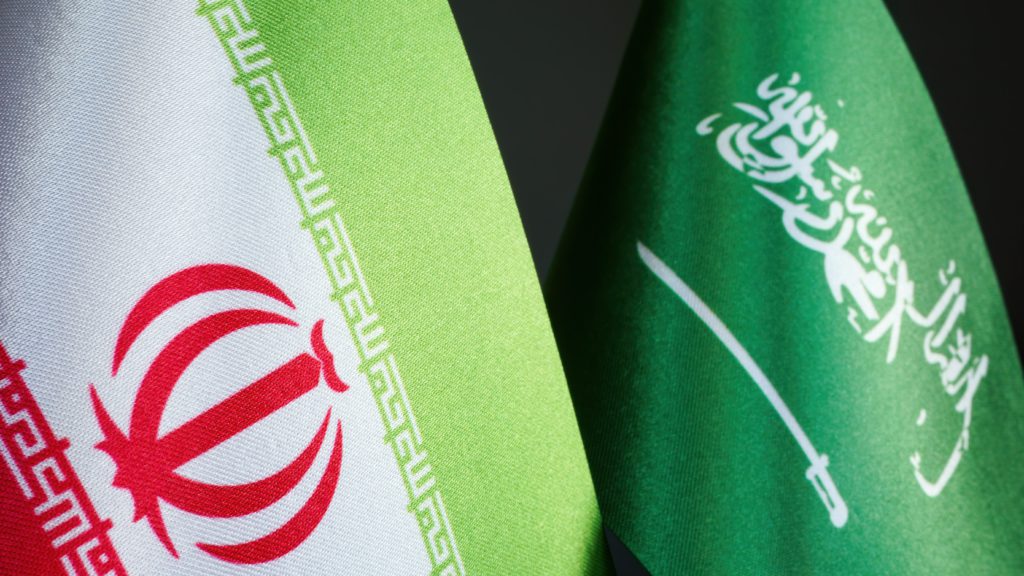Saudi Arabia and Iran ease Mideast rift that rattled oil

Iran and Saudi Arabia agreed to restore diplomatic ties under a deal facilitated by China, easing a geopolitical rivalry in the Persian Gulf and highlighting Beijing’s growing influence in the region.
The countries have been reaching out to each other for at least the past two years, first secretly and gradually more publicly. It’s part of a broader regional realignment that’s seen several old foes reestablish or forge new ties as the US steps back from the Middle East, a key security concern for Riyadh.
The deal to restore relations, which includes commitments to reopen embassies within two months, was signed in China after days of negotiations between secretary of Iran’s Supreme National Security Council Ali Shamkhani and his Saudi counterpart, the Islamic Republic News Agency reported. Saudi state-run media confirmed the agreement.
“Clearing up misunderstandings” and looking toward better relations “will certainly develop regional security and increase cooperation between Persian Gulf countries,” IRNA cited Shamkhani as saying.
Oil prices showed little immediate reaction to the agreement, though analysts said it could soften the geopolitical premium that has periodically hit the market as a result of tensions between the two adversaries, which back opposing sides in the war in Yemen.
National Security Council spokesman John Kirby saying Friday that the US believed internal pressures within Iran and Saudi Arabia’s deterrence measures led to the negotiations – “not just an invitation by the Chinese to talk and to negotiate” Kirby said the US welcomed any development that could ease tensions.
“To the degree that this arrangement can lead to an end to the war in Yemen, to the degree that it can help prevent Saudi Arabia from having to defend itself against attacks, to the degree that could deescalate tensions – all that’s to the good side of the ledger,” Kirby told reporters.
In 2019, an assault claimed by Iran-backed Yemeni fighters on Saudi Arabia’s Abqaiq facility temporarily knocked out half the production capacity in the world’s biggest oil exporter, triggering a brief price spike. Brent futures were trading near $81 a barrel on Friday.
“This is a huge game changer and an acknowledgment that the policy of isolation and containment of Iran has not worked in Riyadh’s interest,” said Sanam Vakil, deputy head of the Middle East and North Africa program at Chatham House.
Saudi Arabia cut diplomatic ties with Iran in 2016 after its embassy in Tehran was set on fire in response to its execution of a prominent Shiite cleric.
Now Riyadh has come around to the idea that direct diplomacy can help the kingdom manage its tensions with Iran, including on Yemen, as well as forestalling future attacks, Vakil said. Work still needs to be done to achieve this, and what was announced today is a roadmap, she added.
China’s role in brokering the agreement is significant, said Torbjorn Soltvedt, chief analyst for the Middle East and North Africa at Verisk Maplecroft, a global risk intelligence group.
“It further strengthens Beijing’s influence in the Persian Gulf,” he said. “The centre of gravity of the region’s oil and gas exports has been shifting east for some time. This year, we have seen stronger signs that China is leveraging this to strengthen its commercial and diplomatic presence in the Middle East.”
Iran and Saudi Arabia had resumed talks in April 2022 to restore ties, in what Iranian state media said at the time was a “positive atmosphere.” Talks had stalled in December after Tehran accused Riyadh of using satellite TV channels to support protests that have rocked the Islamic Republic, the AP reported.
Saudi Arabia, which has battled Iranian-backed fighters in Yemen since 2015, is pushing for an end to a conflict that’s exposed its oil facilities to drone and missile attacks. Establishing formal relations with Iran could help ease that conflict and potentially allow Saudi Arabia to withdraw from the war if a peace deal materializes.
Saudi Arabia’s top priority is to “find a way to have a permanent ceasefire in Yemen,” Saudi Foreign Minister Prince Faisal Bin Farhan said Thursday in Moscow.
(By Yasna Haghdoost, Patrick Sykes and Omar Tamo, with assistance from Sam Dagher, Grant Smith and Justin Sink)
{{ commodity.name }}
{{ post.title }}
{{ post.date }}




Comments